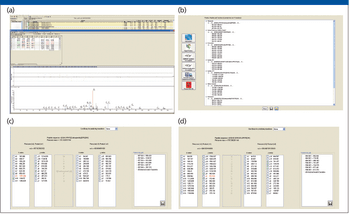
The accurate diagnosis of renal allograft rejection currently depends upon a biopsy. Transplant medicine would benefit greatly from the availability of noninvasive tests for early detection of rejection and immunosuppressive drug therapeutic monitoring. Only a limited number of studies have been published to date on specific proteins associated with allograft rejection. Typically, renal dysfunction due to humoral transplant rejection or other pathologies results in the increase of protein excreted in urine (1–5). In blood, endogenous peptides (not generated by trypsin digestion ex vivo) are likely candidate biomarkers for many diseases and pathologies as they are secreted from tissues and enter the bloodstream (6,7). The analysis of endogenous protein and peptide fragments in urine can provide a noninvasive, early indication of kidney transplant rejection or disease.

